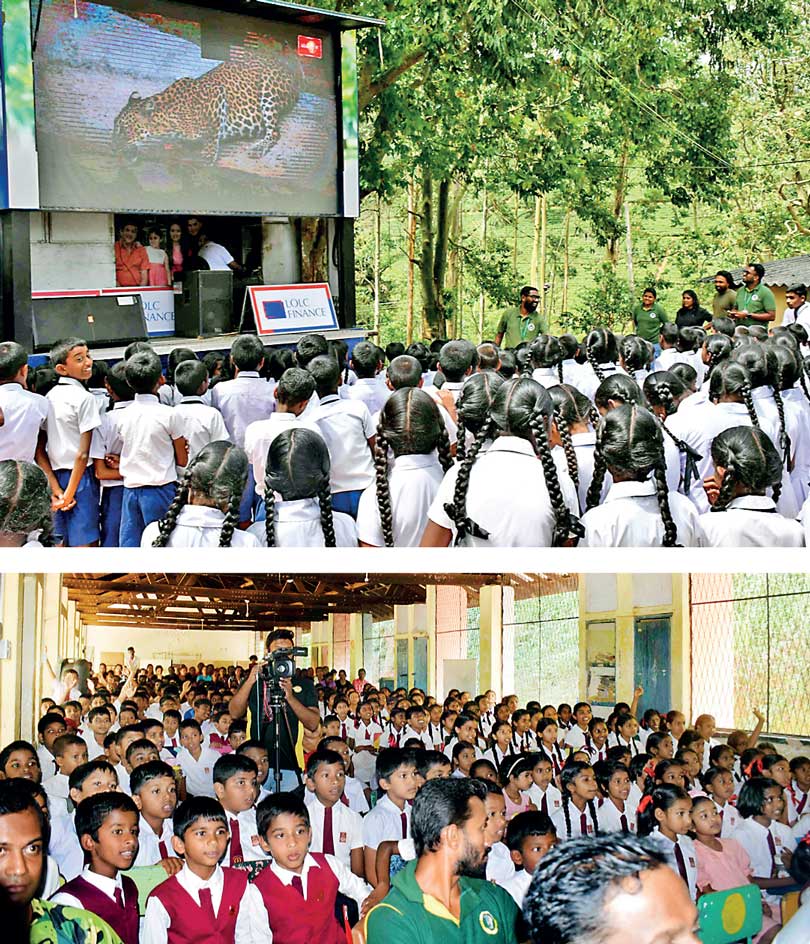Tuesday Feb 17, 2026
Tuesday Feb 17, 2026
Tuesday, 31 December 2024 00:02 - - {{hitsCtrl.values.hits}}

Engaging and educating the students
|
The Department of Wildlife Conservation regional team
WNPS Regional Coordinator from the Kotagala region delivering her presentation
Student sharing their feedback |
Wildlife and Nature Protection Society (WNPS), LOLC Holdings, and Sirasa TV have launched a nationwide initiative aimed at raising awareness and educating rural communities and school children about the Sri Lankan leopard’s critical role in biodiversity. This collaboration marks a pivotal step in conserving the threatened Sri Lankan leopard (Panthera pardus kotiya) and fostering a deeper understanding of its protection.
The Sri Lankan leopard, a unique subspecies found only on the island, plays a vital role in maintaining the ecological balance of natural ecosystems. However, habitat loss, human-leopard conflicts, and poaching pose significant threats to its survival. To address these challenges, WNPS, LOLC, and Sirasa TV have joined forces to launch educational programs designed to teach children and adults the importance of leopards and the need to preserve them for future generations.
This initiative forms an integral part of the five-year WNPS LOLC Multi-Regional Leopard Conservation Project, which focuses on research, habitat protection, and community engagement to ensure the long-term survival of the Sri Lankan leopard. By combining education, conservation, and research, the program aims to create a sustainable framework for coexistence between humans and leopards across the island.
“Conservation must start at the grassroots level. Educating school children on coexistence with wild animals, especially leopards, is crucial for building a sustainable future,” said WNPS Co-Chair of the Wildcats Subcommittee Prof. Enoka Kudavidanage.
The initiative conducted educational and awareness programs in rural schools and communities, where human-wildlife interactions often lead to conflicts. Held between October and December, these programs aimed to educate students, teachers, and local residents about coexisting with leopards and protecting their habitats.
12 programs were successfully organised through the six regional centres of the WNPS LOLC Multi-Regional Leopard Research and Conservation Project in Kilinochchi, Belihuloya, Sigiriya, Kalawana, Kotagala, and Panama. These sessions targeted rural school students and communities living near leopard habitats. Morning sessions engaged students, while evening discussions involved local residents, emphasising the importance of coexistence and addressing misconceptions about leopards.
The initiative’s goals included highlighting the ecological significance of leopards as apex predators, reducing human-leopard conflicts, and offering practical advice to create safer environments for both people and wildlife. By involving school children, the program aimed to foster a culture of conservation and respect for leopards, ensuring its long-term impact.
LOLC Chief Operating Officer Kithsiri Gunawardena said: “Educating the younger generation about the importance of coexistence ensures that the values of conservation are deeply rooted in communities.”
Government officers, particularly from the Department of Wildlife Conservation, played a critical role in the success of these programs. Their expertise bridged the gap between local communities and national conservation goals, enhancing the credibility and effectiveness of the initiative.
The collaboration between WNPS, LOLC, and Sirasa TV underscores the importance of collective action in wildlife conservation. In addition to education, the initiative encourages public involvement through volunteering, spreading awareness, and assisting local authorities in reporting incidents. This partnership represents a significant step toward sustainable coexistence between humans and leopards.
LOLC Holdings’ involvement highlights the private sector’s vital role in biodiversity conservation. Their commitment, coupled with Sirasa TV’s broad media outreach, brought national attention to leopard conservation challenges and solutions.
WNPS extended gratitude to the regional and branch managers of LOLC Holdings, Department of Wildlife Conservation officials, police officers, school principals, and rural community members for their invaluable support. Their collaboration was instrumental in making this initiative a success and safeguarding the future of the iconic Sri Lankan leopard.